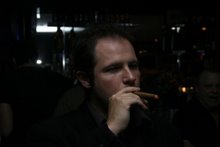4/30/2011
The Wallflower at the Orgy
There is no such thing as objectivity in news, especially not in televised news.
I don't say this because I am a cynic or because I have some bone to pick with journalists but because I recognize that the very nature of news is anti-objective. By simply pointing a camera at something or committing words to paper, objectivity has been discarded and significance conferred. This is not to say that fairness in reporting should not be the greatest goal of the profession; it should be. Objectivity, like any other form of perfection, is impossible but nonetheless worthy of being pursued, no matter how asymptotic the path. Because this latent bias is often so subtle that even the journalists, themselves are not fully conscious of it, the public must be attuned to the many ways that media, through design or accident, subtly alters the perception of its subjects.
This whole tirade was inspired as I watched a rerun of Christiane Amanpour's recent documentary series God's Warriors, a trio of works that I found both inspiring and terrifying and that I highly recommend. It is also a terrific example of what I'm trying to explain.
Amanpour interviews a number of Iranians in the course of the series and she states openly at one point that she is originally Iranian. According to her Wikipedia Profile she lived in Iran until her adolescence. The reasonable assumption is that she speaks Farsi and can probably communicate clearly with the people she is interviewing. Despite this, she is never seen or heard speaking Farsi. All of her questions to interviewees are delivered in English and responses are delivered in the speaker's own language, which we presume to be Farsi. The answer is then translated in voiceover by someone other than Amanpour.
This raises some obvious questions about how the interviews are framed. Since the interviewees begin responding immediately after the question is asked in English without waiting for a translation, they have obviously been primed on the question in advance. With whom did they speak? Did Amanpour ask the questions herself? Did a translator? Was there even a translator present? If there was, why? Is Amanpour idiomatically fluent in Farsi or did her day to day use of the language end when she left Iran as a child? Did CNN or any of the interviewees request an additional translator to be double sure of correct communication?
I'm not suggesting any malfeasance on CNN or Christiane Amanpour's part. In fact I hold Ms. Amanpour in the highest of respect. This could have been a basic production decision made based on the fact that the primary audience for this program is American. It could be a time issue. CNN might simply have wanted viewers to identify with the reporter. It is also possible that Amanpour is not comfortable enough in her Farsi to conduct such interviews. In the minds of the production team, this was probably an innocuous decision. For the most part it was and likely, few other people even noticed. This does not change the fact that what we saw on the show cannot simply be taken at face value.
The television programs we see on the twenty four hour cable cycle or on our local affiliates are the result of some very complex interplay between public welfare, professional ambition, cultural relevance, pleasing sponsors, attracting viewers and trying to get a hold on that ever elusive beast, the truth. But we, the viewing public, must be careful to watch closely the subtleties of reporting and of television production and always wonder if they conceal some deception. Television is the greatest tool of public opinion and the greatest weapon of ideology ever created. We must be skeptical lest that weapon be turned on us.
Subscribe to:
Post Comments (Atom)


1 comment:
The concluding paragraph makes the article. Your posts of late have taken a turn for toward seriousness, which jarred me a little at first. However, it was worth the serious reading.
Post a Comment